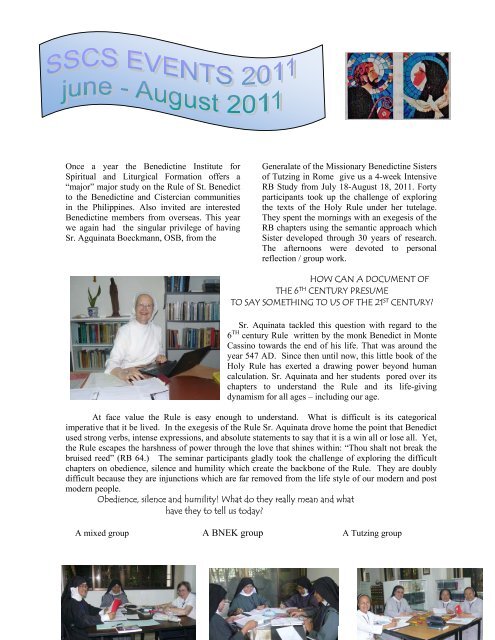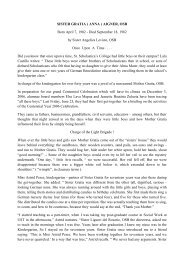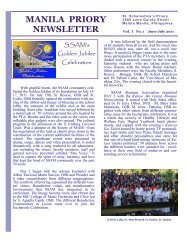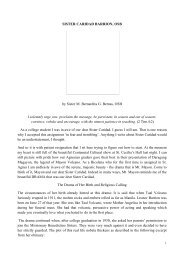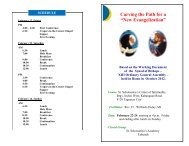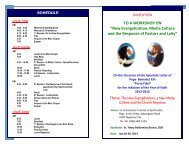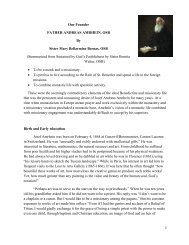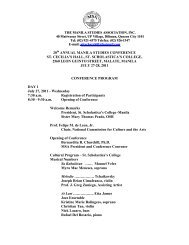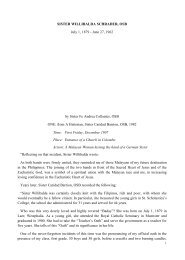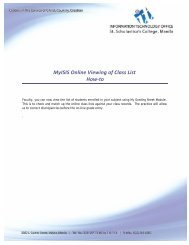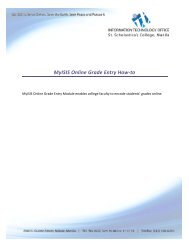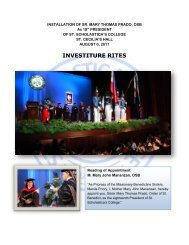Sr. Aquinata, OSB draws 43 participants to RB Course in Tagaytay
Sr. Aquinata, OSB draws 43 participants to RB Course in Tagaytay
Sr. Aquinata, OSB draws 43 participants to RB Course in Tagaytay
You also want an ePaper? Increase the reach of your titles
YUMPU automatically turns print PDFs into web optimized ePapers that Google loves.
Once a year the Benedict<strong>in</strong>e Institute for<br />
Spiritual and Liturgical Formation offers a<br />
“major” major study on the Rule of St. Benedict<br />
<strong>to</strong> the Benedict<strong>in</strong>e and Cistercian communities<br />
<strong>in</strong> the Philipp<strong>in</strong>es. Also <strong>in</strong>vited are <strong>in</strong>terested<br />
Benedict<strong>in</strong>e members from overseas. This year<br />
we aga<strong>in</strong> had the s<strong>in</strong>gular privilege of hav<strong>in</strong>g<br />
<strong>Sr</strong>. Agqu<strong>in</strong>ata Boeckmann, <strong>OSB</strong>, from the<br />
Generalate of the Missionary Benedict<strong>in</strong>e Sisters<br />
of Tutz<strong>in</strong>g <strong>in</strong> Rome give us a 4-week Intensive<br />
<strong>RB</strong> Study from July 18-August 18, 2011. Forty<br />
<strong>participants</strong> <strong>to</strong>ok up the challenge of explor<strong>in</strong>g<br />
the texts of the Holy Rule under her tutelage.<br />
They spent the morn<strong>in</strong>gs with an exegesis of the<br />
<strong>RB</strong> chapters us<strong>in</strong>g the semantic approach which<br />
Sister developed through 30 years of research.<br />
The afternoons were devoted <strong>to</strong> personal<br />
reflection / group work.<br />
HOW CAN A DOCUMENT OF<br />
THE 6 TH CENTURY PRESUME<br />
TO SAY SOMETHING TO US OF THE 21 ST CENTURY?<br />
<strong>Sr</strong>. <strong>Aqu<strong>in</strong>ata</strong> tackled this question with regard <strong>to</strong> the<br />
6 TH century Rule written by the monk Benedict <strong>in</strong> Monte<br />
Cass<strong>in</strong>o <strong>to</strong>wards the end of his life. That was around the<br />
year 547 AD. S<strong>in</strong>ce then until now, this little book of the<br />
Holy Rule has exerted a draw<strong>in</strong>g power beyond human<br />
calculation. <strong>Sr</strong>. <strong>Aqu<strong>in</strong>ata</strong> and her students pored over its<br />
chapters <strong>to</strong> understand the Rule and its life-giv<strong>in</strong>g<br />
dynamism for all ages – <strong>in</strong>clud<strong>in</strong>g our age.<br />
At face value the Rule is easy enough <strong>to</strong> understand. What is difficult is its categorical<br />
imperative that it be lived. In the exegesis of the Rule <strong>Sr</strong>. <strong>Aqu<strong>in</strong>ata</strong> drove home the po<strong>in</strong>t that Benedict<br />
used strong verbs, <strong>in</strong>tense expressions, and absolute statements <strong>to</strong> say that it is a w<strong>in</strong> all or lose all. Yet,<br />
the Rule escapes the harshness of power through the love that sh<strong>in</strong>es with<strong>in</strong>: “Thou shalt not break the<br />
bruised reed” (<strong>RB</strong> 64.) The sem<strong>in</strong>ar <strong>participants</strong> gladly <strong>to</strong>ok the challenge of explor<strong>in</strong>g the difficult<br />
chapters on obedience, silence and humility which create the backbone of the Rule. They are doubly<br />
difficult because they are <strong>in</strong>junctions which are far removed from the life style of our modern and post<br />
modern people.<br />
Obedience, silence and humility! What do they really mean and what<br />
have they <strong>to</strong> tell us <strong>to</strong>day?<br />
A mixed group A BNEK group A Tutz<strong>in</strong>g group
From the “Brief Notes” of <strong>Sr</strong>. Esperanza we have a precious resume of the lectures<br />
on these three rather “difficult” teach<strong>in</strong>gs of St. Benedict.<br />
Obedience<br />
The most dist<strong>in</strong>guished character of<br />
obedience is immediacy. In fact, it is the first<br />
degree of humility (Obedience without delay)<br />
as mentioned <strong>in</strong> the <strong>RB</strong>. When we follow the<br />
voice of the ones who call us <strong>to</strong> a higher<br />
service or any service, we put down our own<br />
concerns and <strong>in</strong>terests, allow ourselves <strong>to</strong> be<br />
led by the <strong>in</strong>sight of another with a relaxed<br />
grasp. We empty ourselves out so that we can<br />
realize the presence of God, the div<strong>in</strong>ely<br />
human. Human self will is our greatest<br />
enemy; obedience is a help for us <strong>in</strong> lett<strong>in</strong>g<br />
God prevail.<br />
The Abbot is <strong>to</strong> be obeyed by the<br />
monk and yet Benedict is open <strong>to</strong> dialogue<br />
where<strong>in</strong> the monk is heard. The monk sees<br />
Christ whom he loves as the One giv<strong>in</strong>g the<br />
task <strong>in</strong> the person of the Abbot. Hence, the<br />
monk obeys out of love for God Who loves<br />
him first. In other words, out of reverence <strong>to</strong><br />
the Superior (Abbot), the monk obeys. If the<br />
order/command is impossible, the monk may<br />
ask for a dialogue with the superior, but at the<br />
end, he should heed the superior. Obey the<br />
human superior for love of God. We have <strong>to</strong><br />
have the love of God; otherwise, this is not<br />
possible. Render obedience <strong>in</strong> humility.<br />
Humility<br />
This is one of the foundations of<br />
monastic life. True humility is simply a<br />
measure of the self that is accepted without<br />
exaggerated approval or exaggerated guilt. It<br />
is the ability <strong>to</strong> know ourselves as God knows<br />
us and <strong>to</strong> know that it is the little we are that is<br />
precisely our claim on God. It is the<br />
foundation of our relationship with God, our<br />
connectedness with others, our acceptance of<br />
ourselves, our way of us<strong>in</strong>g the goods of the<br />
earth and even our way of walk<strong>in</strong>g through the<br />
world without arrogance, dom<strong>in</strong>ation, scorn,<br />
put-downs, disda<strong>in</strong> and self-centeredness.<br />
In this chapter, St. Benedict teaches us<br />
a <strong>to</strong>tal human approach <strong>to</strong> God. If we reach<br />
out and meet God where He is, if we accept<br />
God’s will <strong>in</strong> our life, where our will does not<br />
prevail, if we are will<strong>in</strong>g <strong>to</strong> learn from others,<br />
if we can see ourselves and accept ourselves<br />
for what we are and grow from that, if we can<br />
live simply, if we can respect others and<br />
reverence them, if we can be a good steward,<br />
then we will have achieved perfect love for<br />
God <strong>in</strong> Christ who casts out fear.<br />
Silence / Taciturnity<br />
This is the corners<strong>to</strong>ne of Monastic / Benedict<strong>in</strong>e<br />
life. Monastic silence which is our goal, is respect for<br />
others – a sense of place and spirit of peace. It helps us<br />
<strong>to</strong> listen always <strong>to</strong> the voice of God, <strong>to</strong> listen <strong>to</strong> another,<br />
<strong>to</strong> sit silently <strong>in</strong> the presence of God and <strong>to</strong> ponder. A<br />
monk refra<strong>in</strong>s from speech for the love of silence. He is<br />
admonished <strong>to</strong> refra<strong>in</strong> from speak<strong>in</strong>g even good words,<br />
but much more, from bad words. In chapter 72, it is<br />
implied <strong>in</strong> “what he judges better for someone else” that<br />
if the word is good for the others <strong>to</strong> hear, let him speak. If silence is good for the others, then silence<br />
is observed. We use our <strong>to</strong>ngue <strong>to</strong> praise the Lord and not <strong>to</strong> speak or talk bad th<strong>in</strong>gs. Refra<strong>in</strong> from<br />
speech for the edification of others. Silence would help persons live <strong>in</strong> unity and enable<br />
them <strong>to</strong> see the needs of others <strong>in</strong> the community and of all peoples.<br />
Silence is pure prayer. Authentic silence is the <strong>in</strong>ner peace. It is a means <strong>to</strong> love, <strong>to</strong> be open<br />
<strong>to</strong> God and neighbor. It is an attitude <strong>to</strong> be attentive, <strong>to</strong> conquer s<strong>in</strong>, <strong>to</strong> conquer the negative.


